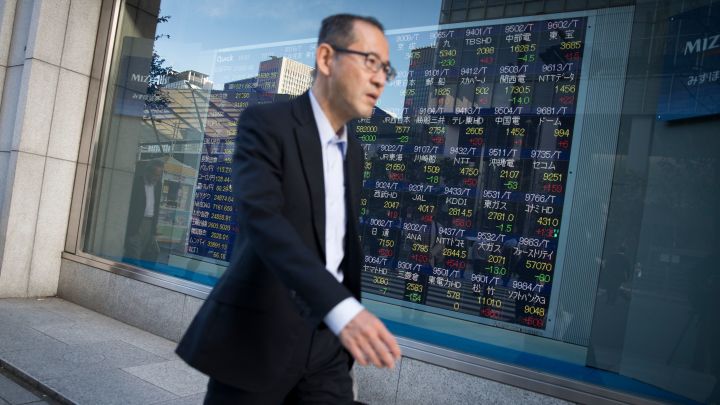
Asia markets traded mixed on Monday afternoon as energy stocks declined after oil prices fell last week to their lowest levels in more than a year.
Chinese markets gained by the end of the morning session. The Shanghai composite was up about 0.29 percent while the Shenzhen composite rose 0.108 percent.
Hong Kong’s Hang Seng index saw gains of 1.69 percent.
Investors are looking ahead at a highly anticipated meeting between President Xi Jinping and President Donald Trump at the upcoming G-20 summit in Buenos Aires, Argentina, which is scheduled to happen at the end of this week.
“I think at the moment both China and America are being hurt by this trade war,” David Kuo, CEO of The Motley Fool Singapore, told CNBC’s “Street Signs” on Monday.
“There is no denying that,” he said. “I think this G-20 they’ll sit down and they’ll have a discussion and they’ll go: ‘Let’s cool it off for a bit.'”
Elsewhere, Japan’s Nikkei 225 rose 0.6 percent in afternoon trade while the Topix index saw gains of 0.1 percent. South Korea’s Kospi advanced 1.08 percent.
Over in Australia, the benchmark ASX 200 fell 0.86 percent in afternoon trade, with the energy subindex down 2.71 percent and the materials sector off by 2.41 percent.
Major miners declined: Shares of Rio Tinto fell 3.3 percent while Fortescue Metals Group declined 3.99 percent. BHP Billiton dropped 3.41 percent. Metal prices fell on Friday amid concerns over weaker demand from China.
Oil prices recover after Friday loss
Oil prices plunged to their lowest levels in more than a year on Friday, deepening a rapid seven-week-sell-off that has plunged crude futures deep into a bear market amid growing worries of an oversupply.
U.S. benchmark West Texas Intermediate crude ended Friday’s session down $4.21, or 7.7 percent, at $50.42. WTI hit its weakest price since mid-October 2017 on Friday.
International benchmark Brent crude dropped $3.66, or 5.9 percent, to $58.94 by 1:34 p.m. ET. The contract hit its lowest level since late October 2017.
Friday’s declines further ramp up the pressure on OPEC ahead of a much-anticipated meeting between the influential oil cartel and its allies in Vienna on Dec. 6, when they are expected to announce that output will be curtailed.
“OPEC should cut production, probably at least a million barrels,” Dominic Schnider, head of commodities and Asia-Pacific foreign exchange at UBS Wealth Management, told CNBC on Monday. “I think that’s going to see prices actually going up quite sharply.”
However, Schnider warned that the market could be “underpricing the fact the we are losing barrels” as a result of recent events such as the reimposition of U.S. sanctions on Iranian crude exports.
“Maybe in the short-term, we have enough supply but I think going into 2019, the market will tighten up,” he said.
During Asia’s trading hours on Monday afternoon, U.S. crude futures gained 0.97 percent at $50.91 per barrel while Brent was up 1.56 percent at $59.72 per barrel.
The slight recovery in oil prices failed to boost energy stocks in the region. Australia’s Santos fell 4.69 percent, Oil Search was down 4.03 percent, Woodside Petroleum declined 2.71 percent while Beach Energy dropped 3.77 percent.
Over in Japan, Inpex fell 3.03 percent while JXTG dropped 2.31 percent and Japan Petroleum Exploration saw losses of 2.31 percent. Fuji Oil, on the other hand, rose 1.87 percent. South Korea’s S-Oil fell 4.59 percent while SK Innovation declined 3.49 percent.
The losses extended to China, where shares of PetroChina fell 0.52 percent and China Petroleum & Chemical, also known as Sinopec, slipped 0.34 percent.
EU leaders back Brexit deal
European Union leaders gave their official endorsement of U.K. Prime Minister Theresa May’s Brexit withdrawal on Sunday during a gathering in Brussels.
European Commission President Jean-Claude Juncker reiterated his sadness at the U.K.’s departure, telling reporters in the Belgian capital that it was a “tragedy.” But he backed May’s plan and said it was the best deal possible for Britain.
But the EU’s acceptance of the deal has enraged some pro-Brexit politicians in the U.K. who believe that May is making too many concessions to the EU. May faces a tough challenge next month when she needs to gain Parliamentary approval for the deal in Westminster. The vote — likely to be on December 11 — is crucial for May to move forward with Brexit and failure could lead to her being toppled as leader or even the U.K. crashing out of the EU without a deal.
The British pound traded at $1.2811 on Monday morning after seeing an earlier low of $1.2794.
Currencies
The U.S. dollar index, which tracks the greenback against a basket of its peers, was at 96.947 after rallying from the 96.43 handle in the previous session.
The Japanese yen was at 113.22 against the dollar after seeing an earlier high of 112.85. The Australian dollar traded at $0.7241 after declining from the $0.725 handle in the previous session.
























